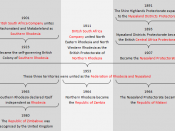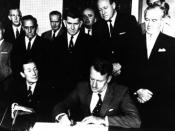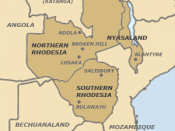The British colony of Rhodesia gained its independence in 1980 and became the Republic of Zimbabwe. This country started with great promise but has been put through major economic and political problems due to flawed policies executed by Ian Smith, the last leader of Rhodesia and most importantly, Robert Mugabe who has lead Zimbabwe since independence. Zimbabwe used to be one of the most prosperous nations in Sub-Saharan Africa with an economy based upon agriculture. Indeed, in the 1980s, Zimbabwe was able to not only supply its own needs and could also export food to drought stricken Ethiopia. Two decades later, the economic and political situation has deteriorated to a disastrous situation where unemployment is estimated at 70 percent and gross domestic product has contracted by 30 percent in the last five years. Similar statistics concerning school attendance, inflation and poverty levels reinforce the situation that the economy and society have basically collapsed.
My thesis for this paper is that the tyrannical leadership of Ian Douglas Smith and Robert Gabriel Mugabe have directly led to the tragedy and misery inside of Rhodesia and Zimbabwe.
Political History of Rhodesia and Zimbabwe
In 1888, the area that became Northern and Southern Rhodesia became a British sphere of influence. In 1923, Rhodesia became a self-governing British colony with responsibility for all government functions except foreign affairs. It is important to realize that the area of Rhodesia was already inhabited by native peoples but was settled after 1888 by Europeans who displaced the natives from traditional land holdings#. The country had excellent farmland and other natural resources, which attracted European immigrants. The new immigrants had a demand for further farming lands which lead to a series of acts from 1934 on which reserved certain land for Europeans and which displaced the native Africans.
In 1953, Rhodesia was joined by the British with Northern Rhodesia and Nyasaland to form the Central African Federation. This federation was a success economically but was opposed by the native African population who felt that independence would not occur with the government run by white Southern Rhodesians#. The federation ended in 1963 and Northern Rhodesia and Nyasaland became the independent countries of Zambia and Malawi the next year. At that time, the decolonisation of Africa was proceeding at a rapid rate and there were expectations from the British government that Rhodesia would also go to majority rule#. This would have been a reversal of the existing situation where the minority whites controlled the government.
Ian Douglas Smith and the Unilateral Declaration of Independence
The white Rhodesians reacted to the pressures from Britain by becoming increasingly militant and more than ever opposed to majority rule or even shared rule. These hardened attitudes also were reflected in politics where those with strong views against majority rule displaced moderates. Ian Douglas Smith, the deputy to Prime Minister Winston Field replaced his more moderate leader in 1964. Smith was born in Rhodesia in 1919 just after the First World War. He received his Bachelor of Commerce degree from Rhodes University in South Africa and was a pilot in the Royal Air Force in the Second World War#. After the war, he became a farmer in Rhodesia.
Smith entered politics as a member of parliament, first for the Liberal Party, then as a member of Sir Roy Welensky's United Federal Party. Welensky was a former labour leader from Northern Rhodesia who was a founder of the Central African Federation#. In 1962 with the Central African Federation failing, Smith formed the Rhodesian Front Party with Winston Field. The objective of this party was to thwart the plans that the British government had for majority rule in Rhodesia. In the elections that took place in 1962, the Rhodesian Front won a majority of 5 seats and were able to form a government, headed by Winston Field. In April 1964, Ian Smith succeeded the more moderate Field and became Prime Minister. In an election held in 1965, Smith won a massive majority that gave him a mandate to take a hard line against British demands for majority rule#.
On Remembrance Day (11 November, 1965), Smith declared Unilateral Declaration of Independence (UDI) from Britain. "The mantle of the pioneers has fallen on our shoulders," Smith said, calling on white Rhodesians to maintain standards in a "primitive country." The reaction of the British was to deal with Rhodesia in a manner that showed their "liberal credentials and appease the unhappy Organization of African States."# Britain then imposed economic sanctions against Rhodesia that were also adopted by the United Nations and made mandatory for all countries. This lead to years of economic problems and in the 1970s, to guerrilla activity against Rhodesia. The land issue drove the chimurenga#, and caused the belief that the white minority would lose not only its position of privilege but also control of the best land. This lead to huge later problems after independence. It can be argued that opposition to majority rule was pointless and that Smith only managed to make the eventual change more painful. If majority rule occurred in 1964, the problems of Zimbabwe would not exist to their current extent.
Mugabe and Independent Zimbabwe
Robert Mugabe was born in 1924. He was trained as a teacher and is very well educated and holds seven university degrees. He was a leader of the independence movement and led the largest of the guerrilla forces fighting a protracted and bloody war against the Smith government. In the free election after the end of the white rule, he won a majority and became Prime Minister of the new country of Zimbabwe in 1980.#
After independence, Mugabe toned down his rhetoric against whites (but continued to behave ruthlessly against African opponents), and neglected the landless Africans who brought him to power. Zimbabwe had about a decade of peace and a reasonable economy that came from the colonial economic model Zimbabwe received from Rhodesia. However, there was uneven distribution of wealth that saw the whites still at the top of the economy. This caused strong discontent among the poor landless who had fought so hard for independence and who would wonder whether the struggle was worthwhile given the after independence situation#. In the mid-1990s, a combination of personal misrule, Mugabe's reaction to African political opposition and external economic pressure drove what had been a prosperous, semi- industrialized country into economic decline.
At that point, political opposition grew stronger, and to deflect attention from his misrule, Mugabe decided to deal with a problem that he had long neglected. Distribution of land was an issue that went back to the loss of land to the European settlers and was a cause through the Chimurenga. It was also easy and popular to pick on the small, politically powerless white community and blame all of Zimbabwe's problems to it. If Mugabe had addressed the issue of land distribution much earlier, then perhaps there could have been a peaceful land transfer such as took place in Kenya in the 1960s and 1970s#. However, Mugabe ignored the land distribution issue that had brought him to power in the first place and set up the crisis that has had a huge impact upon the country and wiped out the white farming community. If the new owners of the land had been as productive as the whites, there would not be a problem. However, farm production has been far lower under black ownership so the economy is in crisis#. You can argue that the white farmers are also to blame as they should have somehow addressed the land issue. However, it is not clear how that would occur.
The majority of the land (70 percent) was held by white farmers. Mugabe received shocking results in a late 1990s constitutional referendum he put forth that would increase his power. Even though he controlled the media, the schools, the police, and the army, voters rejected his proposals. A new movement called the Movement for Democratic Change (MDC) that was a group of civic groups, unions, constitutional reformers, and marginal opposition parties had emerged#. Mugabe blamed the whites and their farm workers for the growth of the MDC and for his loss in the vote.
Mugabe's reaction was to start in February, 2002 what he called "fast-track land reform." "If white settlers just took the land from us without paying for it ..we can, in a similar way, just take it from them without paying for it." In 1896 Africans had suffered huge casualties in an eighteen-month rebellion against British pioneers known as the chimurenga, or "liberation war." The war that brought Zimbabwean blacks self-rule was known as the second chimurenga. Mugabe called his land policy the third chimurenga.
Initially, the farmers tried to resist, but it became clear after several white farmers were murdered that they were too few and that resistance was pointless. Of the 4,000 large commercial farmers, all but 500 have been forced off their land. Most Zimbabweans (including white farmers) say that land reform was both necessary and inevitable#. There are also claims that the white farmers did not utilize all their land and that they were often absentee farmers. The problem of Mugabe's approach is that it has harmed those whom the land reform process should have helped. Generally the farms have not been given to black farm managers or farm workers but have gone to political elites. About 130,000 formerly landless peasants and veterans of the war helped the ruling elites to take over the farms, but now that the dirty work is done, many of them are themselves being displaced#. More than a million farm workers and their dependents have been displaced, and they are now at grave risk of starvation. There are interrelated major problems with unemployment, inflation, poverty and people leaving the country.
On a personal level, Mugabe has made much of his devout Christianity, but his marriage to a former private secretary in 1996 who was 41 years younger than himself and with whom he already fathered two children is interesting. He has also pursued what he regards as a deeply moral campaign against homosexuality making "unnatural sex acts" illegal with a penalty of up to 10 years in prison.
Mugabe has been criticized for committing his armed forces to an expensive intervention in the Congolese civil war. One author claims that this was done to avoid having the armed forces join together with the war veterans as a political force against Mugabe. Local journalists who have tried to investigate corruption allegations against Mugabe and his family say they have been intimidated and in some cases tortured#. Until recently, Mr Mugabe had always been able to stifle political opposition. His Zanu-PF party still dominates to today in 2004 even with growing dissatisfaction with the Mugabe and his leadership which led to the near overthrowing of his party in a very controversial election that took place two years ago where there have been many allegations of vote buying and fraud which led to Zimbabwe being thrown out of the commonwealth.
Summary
"You can't imagine how many people come up to me and say, 'We didn't agree with you back then. We thought you were too rigid and inflexible. But now we see you were right. You were so right: they were not fit to govern.'"#
Ian Smith
Smith is referring to majority rule in Zimbabwe. However, he is wrong and looks at the situation in a racist fashion. The reason why major problems have occurred in Zimbabwe is not because the leader happens to be black. The current leader is a despot who is past his productive stage. The problems in Zimbabwe are a result of leadership. Smith contributed to the problem as he failed to realize that African rule was inevitable. By his delay, the new country had to deal with landless war veterans. Mugabe should have confronted the land issue much earlier.
Both leaders share a basic misconception about power. They must realize that a government cannot survive indefinitely when it advances the political and economic desires of the few at the expense of the many. This misconception of power has led to the current tragedy of the country. My thesis is that the leadership of Ian Smith and Robert Mugabe have directly led to the tragedy and misery inside of Rhodesia and Zimbabwe.


